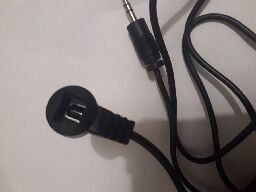What is this wire for?


At one end of the wire is a 3.5 mm Jack plug. On the other end of the wire is presumably a glass LED.
When connected to the phone, nothing happens. The LED does not start to glow.
Also, this wire doesn't work as a microphone. It's also not an earpiece.
What is it for?
It is an infrared receiver extension cord.
Say you have a device that is controlled by an infrared remote, but is tucked away out of line of sight.
You can use this cord to move the infrared receiver into sight.
Here it is on amazon : https://www.amazon.com/uxcell-Infrared-Receiver-Receiving-Distance/dp/B07FKMK3GZ
Can't it be used as a replacement for the infrared port (if the phone doesn't have one)?
Typically IR transmitter LEDs are transparent or light blueish, to allow as many photons as possible to exit the LED.
Typically IR receiver LEDs are dark, almost black, made to block out visible light and only pass through infrared wavelengths of light.
Here you see an IR transmitter LED on top and an IR receiver LED below that.
It's a receiver, not a blaster
No, but you can get something like this to do what you are asking
https://a.co/d/e6DROYc
No, since your phone only outputs audio through the headphone jack. These required a PC card that used a jack that's wired up to use this.
Audio jack or blaster adapters for phones used to be common. You can still buy them on eBay.
Audio is voltage changes which can be set to drive an ir led. You use an app that outputs audio that matches the ir signal protocol.
Yes but nowadays you'd buy a USB version since few phones have headphone jacks. They're on Amazon.
Here's an old style headphone jack or blaster adapter:
https://www.ebay.com/itm/404693924792
An Infrared Receiver sensor? https://www.amazon.de/-/en/Infrared-Receiver-Sensor-Mutant-Linux/dp/B07ZP57P5M
It's part of an IR Blaster setup. That looks like the "blaster", aka the IR LED Transmitter. Most receivers have multiple ones to catch reflections and such
!whatisthisthing@lemmy.world
Crazy
Some manufacturers use standard audio connectors to carry just plain power.
They're robust and can carry relatively high current and voltage.
It works, I can see why they get used. After all RCAs are on everything for everything.
I have an e-bike that uses an XLR as a charging port for the battery.
There's an IR led on a cable with a 3.5mm jack somewhere that's an extender for my home cinema system remote.
(That might be what this is, so see if your phone camera can see the IR light from a TV remote and then test it with that thing)
This possible LED plugged into something either home made/bespoke, very old, or Chinese.
Small chance it's from some medical or scientific equipment that hasn't moved with the times.
If it's an LED put a DC voltage down that plug. If it's a light sensor, measure for a DC voltage.
Audio AC signals didn't have an effect so it's probably a DC component.
My bet, point your phone camera at it and put a DC voltage down there in the right direction and you'll see IR light come out.
It might be the receiver. In which case you need to monitor voltage. Then point a TV remote at it.